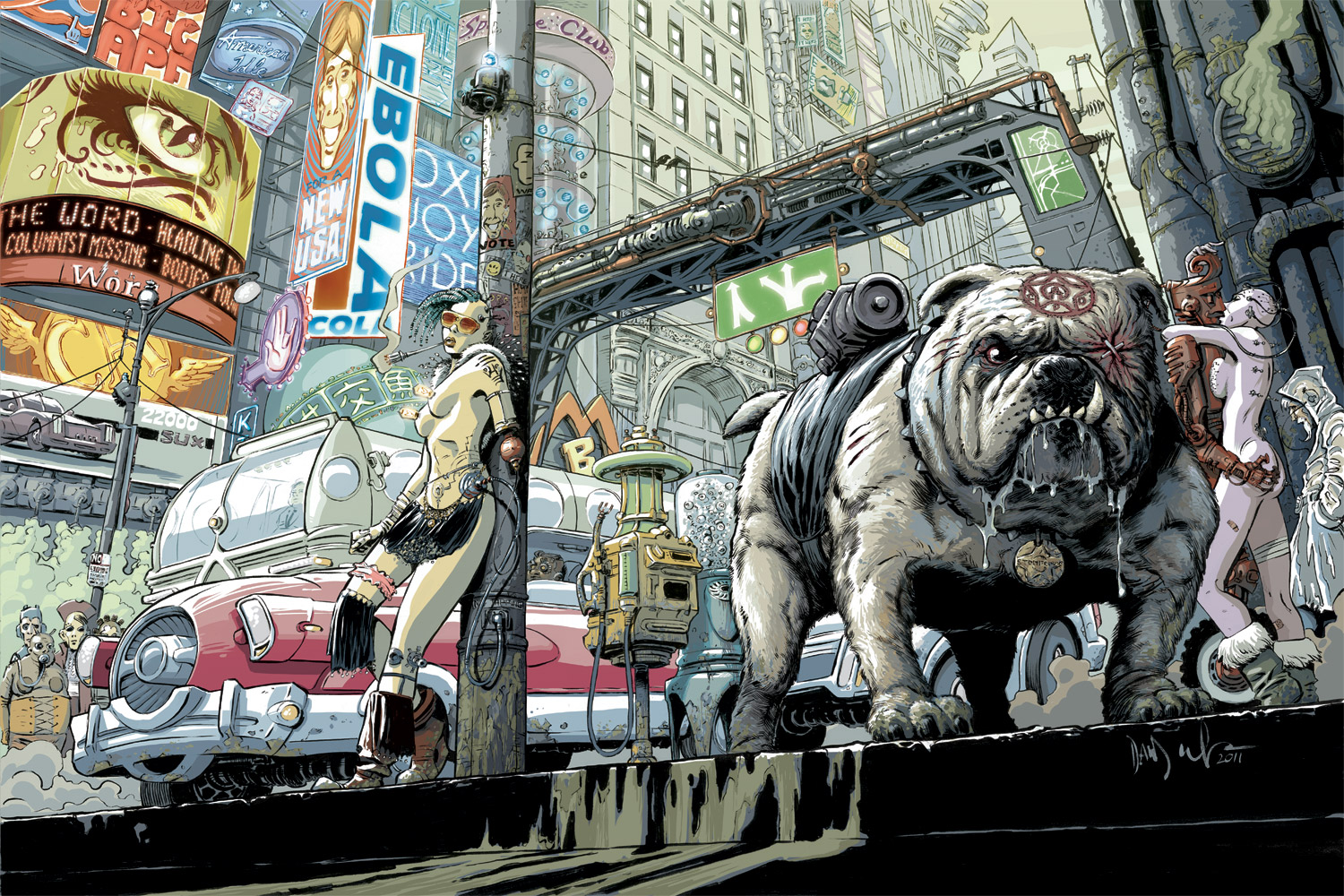Around eight or nine years old, I discovered the Mad Max universe through Beyond the Thunderdome when I happened upon it while flipping through the channels on television. I episodically remember seeing Mel Gibson walking in an empty desert wasteland, then maybe an abandoned car, an airplane, and then (there is no issue with my memory here) seeing Scrooloose for the first time. That creepy bastard. The experience felt both surreal and terrifying – and I couldn’t look away.
Even now, it always feels like I’m walking into a dream when I enter that world. Or, more like a terribly confident and empty nightmare.
So, even though it is universally considered the worst one, I have a sentimental love for Mad Max: Beyond the Thunderdome because it was a major turning point in my life: it’s one of the first pieces of storytelling that introduced me to the skill of world-building and the disconcerting thrill of experiencing a fictional place that is both insanely unrealistic and completely familiar.

Watching the trailer and then finally Fury Road, I sat in awe of director George Miller as that crazy universe from my childhood unveiled itself, even more vivid with its gorgeous oranges, brutal whites, and high energy tans – the rocks, the cars, the grotesqueness, the open, never-ending spaces. The total wasteland. The beautiful, dusty, consuming sand!
It got me thinking about the literary and comic book worlds that I would love to see made into a film.
I do understand why so many great books and comics aren’t adapted (outside of the cost). Adaption is a tricky art. The best adaptations of a book or comic retain something of the original piece of art while still being changed, modified, and reinvented by the director.
So, to help out all those Studio Execs and give my uber-nerd fangirl some superawesomefuntime, I decided to figure out if I could match up a great director with some of my favorite novels and comics that have yet to be adapted. Below you will find my first two choices with my director picks, and in a second post to come, I will follow up with two more. In honor of Fury Road, all the worlds I have chosen are dystopian or dystopian-esque.
Ambient (1987) by Jack Womack
Ambient is a dystopian (cyberpunk) novel set in a burned-out New York City and told from the perspective of its main character, O’Malley, a bodyguard for Dryden, the CEO of Dryo. There is no government in the dystopian future Jack Womack imagines, instead society is run by a massive corporation called Dryco. Ambient is the first installment in a series of novels that have been nicknamed “The Dryco Series.”
In this futuristic New York City, buildings and whole sections of the city are in disrepair while other parts are well-maintained. There are mutants, or Ambients, who were deformed by a nuclear spill (or by self-infliction) and have their own language, that hole up on one side of the city and meet underground in the sewers. There is a realism to Womack’s vision that I have always appreciated: a functioning society living in a world half in disrepair because there are enough survivors to maintain civilization, but not enough to actually reconstruct the world back to its former glory. Think of a zombie apocolypse movie, however, instead of everyone holed up in one area or wandering aimlessly, they are traveling in fancy cars and walking around, going to their business meetings, dressed professionally (or like a complete whore, as Dryden’s mistress is all the time) with rubble popping up in a shot and broken glass on the street.

Womack creates a universe that is both intentionally familiar while still being disconcerting. Violence is commonplace and unexceptional. It is also darkly humorous and satirical.
I want to see deformed mutants (especially after seeing Fury Road), random absurd violence, cool, weird languages, and strange games called Conferences where women skate around in a ring and fight each other to the death.
My Director(s) Pick: Joel & Ethan Coen

Joel & Ethan Coen are ballers. They are demi-gods of satire. Full-blown gods of black humor. Lords of adaptation and remakes. Watching Fargo, Barton Fink, O Brother Where Art Thou, True Grit, Raising Arizona, and the Big Lebowski back to back shows their virtuosity and the extent to which they can create distinct and moving narratives.
In many ways, Womack and The Coen Brothers are similar storytellers. They juxtopose realism with absurdity, making their audiences think critically about the worst traits of humanity and society, all the while making us laugh hysterically. Also, like Womack, they love taking the wind out of pretensions and don’t have much reverence for traditional values or hypocritical cultural ideals.

For example, Fargo is set in a world so fully realized and realistic that each shot makes you feel the crunch of snow, the open wasteland of ice, the freezing cold. The major motivating factors for most of the characters in the film are desperation and isolation. Yet, Fargo is funny – so unbelievably funny. Every time I watch the woodchipper scene at the end, I feel horror and then (most times) begin to laugh like a sick demented jerk before becoming horrified again.
The Coen Brothers have never done a science-fiction or dystopian story, and I think Ambient would be a perfect opportunity for them to get their feet muddy. They would be able to take Womack’s sly humor and satirical energy and make it pop. In their skilled hands, Elvissey, the religion followed by many people in the Dryco world would be treated with the respectful absurdity it deserves.

Additionally, I can’t see many directors being able to handle the three languages Womack invents for the book. First, there is the Ambient’s language, which is spoken essentially in verse. Then, there is the primary language spoken by the general population, which is a distilled version of our language with added slang, such as “We’ll shortterm” which implies “We’ll only be here for a small amount of time.” Also, nouns are commonly used as verbs. Lastly, there is the language of the youth, which is an even more distilled and stripped down form of English. They basically “noun” all over the place.

I get giddy thinking about the Coen Brothers adapting and playing with Womack’s dialogue. Lines, like “Clerk me!” and “You’re pillowing?” would become delicious, freshly-layered, snappy jokes in their hands.
So to Joel and Ethan Coen: World me! Pretty please, with satirical religions and nuclear bombs on top.
Transmetropolitan (1997-2002) by Warren Ellis & Darick Robertson
Sure, some comic fans have claimed that the plot line of Transmetropolitan and its main character Spider Jerusalem are too derivative (Spider is loosely based on Hunter S. Thompson and gonzo journalism). Sure, I have heard some people criticize Warren Ellis for his bombastic machismo writing style and themes.
But this girl couldn’t honestly care less, because there is no denying that Transmet is set in one badass, awesome world. It has Transients (genetically-modified half-alien humans who are fighting for their rights) and three-eyed smoking fluff cats, sentient bulldogs who work as police officers, pills that counterbalance the effects of smoking, machines that create anything a person wants (sorta), glasses that take videos and pictures (I guess that’s not very interesting anymore with the release and failure of Google Glass), Technophiliacs, constant streams of media and images (again, not particularly crazy now), and a place where people can visit past civilizations, such as the Myans… just to name a few of the things that Ellis creates. Seriously, if you haven’t read it, there’s more. Lastly, I think Spider Jerusalem is a pretty damn fun character. Rant it up, baby!

Darick Robertson’s design and artwork makes The City, the setting of Transmet, a loud, gaudy chaotic playground for Spider to romp around in like a maniacal ID. Robertson makes you feel the noise, the clatter, the yelling, and the unending media spin of this futuristic society. His images have a kinetic motion even on a static page. They yelp and laugh and rant and bounce you around.

In summary, Transmet is a manic, vicious, and irreverent vision of the world, full of unstoppable energy. And I must have it on a big screen with popcorn.
My Director Pick: Paul Thomas Anderson

To quote two of my favorite film critics and podcasters, Adam Kempenaar and Josh Larsen, some of Paul Thomas Anderson’s major themes as a director include “The American Dream, faces, sex, and impotent male rage,” as well as masculinity. Also, as Adam and Josh pointed out in their discussion of The Master, many of Anderson’s films are re-imaginings of classic movies (e.g., There Will Blood is a reinterpretation of Citizen Kane).
I couldn’t agree more with my Filmspotting boys on these points, and these are the exact reasons why I think Anderson would be perfect for bringing Transmetropoliton to the big screen. For these reasons, and because of Inherent Vice.
It’s not just that Anderson dared and succeeded in adapting Thomas Pynchon (what kind of nut job does that to himself? Full disclosure: I couldn’t get through Inherent Vice; Pynchon bores me, so a big hats off to Anderson for making Pynchon engaging for us non-fans), but that it showed on an even more manic-level than Boogie Nights, the kind of chaotic humor Anderson is capable of bringing to the screen.

Now to the other reasons why Anderson is the perfect director. Spider Jerusalem is a rage-filled, slightly diabolical bastard. Machismo and masculinity play a big part in the comics. Spider is ready to rip the hearts out of all the hypocritical, lying politicians and the powerful. He is also impish and a scoundrel, an idealist that hates zealots, an individualist that is concerned about the welfare of others, and a journalist who is skeptical of the American Dream when all the power is in the hands of a few. And his face and facial expressions are an essential aspect (almost their own character in a spacey meta-way) of the comics.
Back in the early 2000s, Warren Ellis was approached about making Transmet into a movie, but the cost for the special effects was too high. Times have changed. The special effects seem possible now. And there would be a lot of special effects, which is more reason why we need a brilliant director like Anderson at the helm. Anderson creates beautiful, big shots that could take in all of the special affects without letting them overtake the whole of the movie. Basically, like George Miller, he could make us believe in this crazy, off-the-wall world.

Lastly, like he did with Pynchon for me, I think Anderson could adapt Transmet in a way that would thrill even the most lukewarm fans of the series, teasing out the machismo, using the unending media stream and energy of the world Ellis and Robertson have created in inventive and meaningful ways.
So, dear, wonderfully talented, always-beautifully directing Paul Thomas Anderson, keep up the mania and the humor momentum you have going with Inherent Vice and make us Transmetropolitan. Please, please do it, before some idiot Studio Exec gives it to Zack Snyder.
Ok, I’ll up the ante. I honestly believe that Joaquin Phoenix would make a fantastic Spider. He gives amazing face. And I know how much Anderson loves working with him. If you shave that lush brown hair off, Voila! We have our Spider!
So there they are, my first two picks. In my next installment, I will tackle my last two.
If you are just dying to know what they are, here are some hints: One of my picks is a new comic series and the author has stated in interviews that he isn’t interested a film or television adaption to happen (Boo, hiss on that!). My other pick is the classiest classic of dystopian literature and has never gotten its time on the big screen.








